In our “The Lord of the Tides” dialogue, Petra and I discuss the glimpse at what could’ve been at that beautiful feast, the evolution of Alicent’s character, the coming war hinging on a “misunderstanding”, the lack of positive religious characters and whether that’s a problem, and just how cool and scary Aemond is.
Petra: The king is dead. Long live … we’re not sure yet.
Luka: Don’t worry: after that dinner, I’m sure the Greens will politely step aside and let Rhaenyra take the throne after that dinner.
Petra: They were so fucking close to, weren’t they? Alicent was, at least, and she’s the Green who matters. She told Rhaenyra she’ll make a fine queen and seemed to mean it. There’s plenty to interpret, obviously, but I thought she looked genuinely sad when Viserys “told” her to make Aegon heir instead. What was your take?
Luka: “So fucking close!” was my take too. Such a beautiful dinner scene. I’m happy that was one of the last things Viserys ever saw—it didn’t turn ugly until after he left, just as things will turn even uglier now that he’s dead. Some people may be skeptical, but I bought the way Alicent and Rhaenyra started to patch things up. This is also my answer to the oft-repeated question of “what were the first five episodes for?”; I don’t think these moments would have been remotely believable—or as emotive as they are—if we hadn’t seen and felt what Rhaenyra and Alicent’s relationship once was. Likewise, it was crucial for their children not to remember any such good times; even if the mothers buried the hatchet at this point, they had long ago poisoned their children with this hate, both intentionally and unintentionally—so they were the ones to fuck it up there at the end. If that fight hadn’t happened, Rhaenyra might have stayed instead of seeing her children off to Dragonstone. She might have stayed with Alicent, continuing to make up, when Viserys died. And then things might have gone very differently than they will.
Petra: I appreciated the tragedy that it’s the children who used to get along (Aegon and Jace and Luke against Aemond, at least) who disrupt the dinner, though I hadn’t considered that Rhaenyra might have been present for her father’s death if it hadn’t been for that fight. I can’t say that I’m a huge fan of the idea that the Dance starts over a misunderstanding, though. We already had two solid motivations for Alicent to usurp the throne (via Aegon): out of fear for her children’s lives and her obsession with Jace, Luke and Joffrey’s bastardy. Hinging it now on a misinterpretation of her husband’s dying words feels like a total non sequitur. I do appreciate that Aegon’s prophecy which began the Targaryen dynasty is also the prophecy that ruins it (“prophecy will bite your prick off” and all that), but from a character standpoint, I don’t like that Alicent is still, at the end of the day, doing what her husband wants. I really liked this idea that in the previous episode when she runs at Lucerys with the dagger, she’s breaking bad and “THROUGH BEING POLITE, GODDAMMIT,” to quote Rose from Titanic. Turns out, she’s still abiding by the men who have always controlled her. Just not what I wanted for her.

Luka: I’ve seen so many interpretations of that final scene, which is fun, but also a bit frustrating. I think we both agree Alicent didn’t learn about the prophecy; she misunderstood a few key words—Aegon, Prince that was Promised, you’re the one, etc—to mean Viserys had decided his son, Prince Aegon, should be king. I don’t quite get how many people seem to think Alicent knows about the prophecy now. I don’t know how she could. Viserys wasn’t being coherent, or explaining himself.
Petra: Now that she’s heard the term “Prince that was Promised,” I suppose she’s in on the lingo, but she’s completely lacking in context. As she understands Viserys’ final words, Aegon has been promised to unite the fractured family.
Luka: Right! As for the Dance of Dragons hinging on a misunderstanding, that’s something I interpreted differently, though I’m still of two minds about it. Alicent was patching things up with Rhaenyra, sure, but she didn’t need much to change her mind, did she? Does she truly believe, thinking rationally on the matter, that Viserys believed Prince fucking Aegon, who is “no son of hers,” is the only salvation of the Targaryens? I don’t think so. I believe she clings to these words she doesn’t truly understand because they provide her with the ‘easy’ way out—or at least the way for which she’s been preparing for the last sixteen years. Also, as you mentioned, it is more than a silly sitcom misunderstanding: it’s the usual way Martin uses prophecies—as unwieldy, destructive things, “a sword without a hilt.” So the tragic irony felt appropriate. My only nagging feeling is the same as yours: did Alicent really need her husband’s permission? Part of me thinks she would, because her whole thing—as hypocritical as it may be—is doing things “the right way,” (“where is duty, where is sacrifice?”), so of course she’d need this royal aproval to truly move forward in supporting Aegon’s claim after that reconciliation. But… I see what you mean too—it’s a bit frustrating to have her swayed by a man again; her father then, now her husband, even if it wasn’t on purpose on his part. How I truly feel about this will be decided, I think, by how things play out from now on, in the next few episodes and in future seasons. I’m just not sure. My first impression was appreciating the tragic irony of it; but then it did cross my mind this was bending Alicent’s character for the sake of drama. But I can’t deny I bought into the drama both times, you know? So I don’t know whether I should complain much. We’ll see.
Petra: I certainly felt the drama: the poignancy of the dance between Jacaerys and Helaena and the sense that everything could have gone so differently, and then the panic of realizing how Alicent was misinterpreting Viserys’ words. It evoked all the right emotions. Perhaps the last two episodes will change my mind but, eight episodes in, I just don’t like how they’ve decided to follow through on Rhaenyra and Alicent’s character set ups. Rhaenyra was described by the showrunners as the embodiment of punk rock and tells her mother she’d rather “serve as a knight and ride to battle and glory” than give birth, but so far all she’s done to buck the system is give birth to three bastards. Alicent is more opaque, I think. I took her as a person who’s been powerless her whole life who, when she finally gets power, refuses to let go of it. Then she obsesses over bastardy and fears Rhaenyra will kill her children, then misinterprets her husband’s dying words. I haven’t gotten a sense of satisfying thematic progression from either of them.
Luka: I don’t know if “progression” is the point—more like their childhood selves and their dreams and fears are being deconstructed in adulthood. But I do see your point—there is a disconnect between the two eras. I just… like that it exists.
Petra: In trying to articulate my frustration to myself, I keep thinking of Daenerys’ arc in the first book of A Song of Ice and Fire and the first season of Game of Thrones. She begins as a catalyst to facilitate her brother’s rise to power, then a catalyst to facilitate her son’s rise to power, and then finally facilitates her own rise to power. She changes a lot, but you can see how it thematically connects with her growing agency as well as her belief in Targaryen exceptionalism. I haven’t seen anything so coherent in House of the Dragon yet.
Luka: I found Alicent’s increased religiosity a coherent response to her actions last episode, though. What’s your take on that? I know you and I have different experiences and views of religion, so I’m curious.
Petra: Which actions last episode? The dagger thing?
Luka: The dagger thing, yes, but specifically doing it in front of so many people. At least that’s how I interpret her very publicly clinging to the Faith of the Seven. A highly visible act of contrition to the realm. A shield—it’s also a sword to use against Rhaenyra’s sins, but that wasn’t so emphasized here.
Petra: Oh, interesting. I hadn’t thought of her growing religiosity as a reaction to her meltdown. Olivia Cooke had said in an interview with Entertainment Weekly back in September that Alicent clings to religion because it gives her a sense of control over her life that she otherwise lacks, so that’s informed my perception of Alicent since the beginning of Cooke’s run, although we did see her praying in the Sept in “The Rogue Prince,” so we know her faith isn’t something she’s only come into in adulthood. I don’t think we know too much about the Faith of the Seven’s stance on violence, so I don’t know if Alicent advocating for “an eye for a very literal eye” goes against her faith.
Luka: I’ve always seen the Faith of the Seven as basically Catholicism with a new coat of paint, so I assume their views on violence is that it’s bad… Except the many times it actually isn’t that bad—sometimes violence can even be holy, actually! But the thing is Alicent went pretty crazy and tried to take a kid’s eye out herself, in defiance of the king’s orders. I think it’s pretty clear that wouldn’t be seen positively by anyone. To be clear, I think Alicent turning so gods-fearing is genuine, not an act—for the reasons you quoted, too; but what is an act, and a deliberate one, is to not only turn so religious but remodel the entire Red Keep to project that to everyone else. That’s what I believe the reaction to her meltdown was.
Petra: There was a great Twitter thread by @JonsWoe about how Alicent refurbishing the Red Keep with holy symbols was a way of turning focus away from the Targaryens. It hadn’t occurred to me that it might be in response to the eyeball fiasco too. I do wish the observantly religious characters weren’t consistently villains, though. In the books there’s a decent balance, but in the shows it’s pretty consistently only power-hungry hypocrites. Septon Meribald was replaced with Brother Ray, who’s more of an omnist than a devout believer in the Seven, for instance. Sansa stops praying once she’s wisened up to the ways of the world in season four. Ned’s concern that the Old Gods won’t hear him in King’s Landing and Reek’s concern that he won’t make it to the Ironborn afterlife if he dies in Winterfell weren’t included in Game of Thrones. In the shows everyone is culturally religious, obviously, but the only characters who talk about the gods, like Melisandre, the High Sparrow and now Alicent, are the ones we’re meant to disagree with.
Luka: With the exception of Catelyn in Game of Thrones, I don’t think you’re wrong. I share the apparent perspective of the scriptwriters on this one, though, so it hasn’t been a problem for me. This is part of a much greater conversation, but with these characters, all of whom are in the halls of politics, if they’re overtly religious I’m going to always assume that, however sincere their beliefs, they’re using their faith as a cudgel. This lack of positive religious representation may connect to another frequent criticism of the show: that we don’t get to know any of the smallfolk—I think I’d be more open to seeing a religious character positively if they didn’t have the institutional power to wield their religion as a weapon.
Petra: Good point. Religion mixing with politics always leads to grim results, in my view, and House of the Dragon is even more politically centered than Game of Thrones, which is ironic, given their titles. I just get tired of the tendency to frame a character wearing a religious symbol as either hypocritical or gullible.
Luka: I get that. Well, I don’t really feel it, but I understand what you mean. I guess this is a disagreement we were bound to have as an atheist and a theist. I don’t think we’re gonna solve religion in this conversation, so maybe we should move on to another element I’m sure you wanted to talk about: Aemond!
Petra: I mentioned earlier that I haven’t found any of the character arcs to be really satisfying so far, but I suppose Aemond is an exception. He went from a long-suffering loser to a violent, overcompensating bully. That’s solid.
Luka: He’s also become scary as hell! An such a character. He’s grown into one of those larger-than-life figures. Very much like Daemon, which is appropriate—they’re drawing the parallels between them pretty clearly, don’t you think?
Petra: Absolutely. Aemond’s reaction to Daemon beheading Vaemond was telling, as was the fact that he did seem intimidated by him at the end of the dinner. The seeds have been planted for events in later seasons already.
Luka: They’re not being subtle about it. Fire and Blood wasn’t either, to a certain extent, but the visual medium allows them to be as direct as can be.
Petra: This was the very last moment of quiet before the storm. Aemond may not be ready to face off against Daemon just yet (if, indeed, he ever does—#NoSpoilers) but after eight slow burn episodes, tensions are finally going to erupt into violence.
Luka: Fire will burn and blood will flow. I probably shouldn’t be this giddy about it.
The post Glass Candle Dialogue: House of the Dragon Season 1, Episode 8 – The Lord of the Tides appeared first on Watchers on the Wall.
Via http://watchersonthewall.com
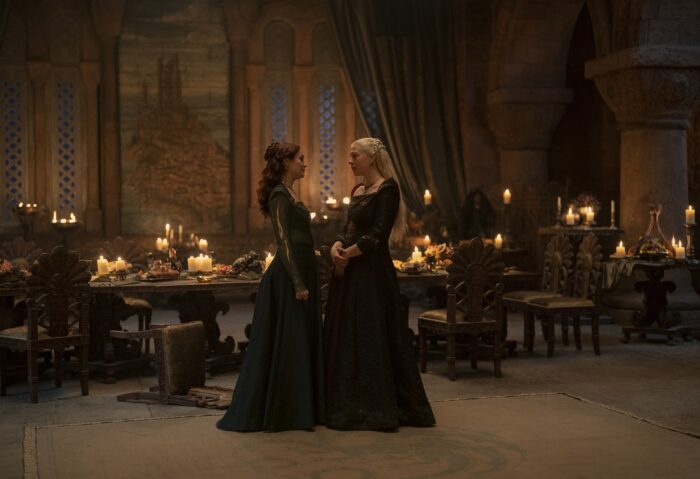
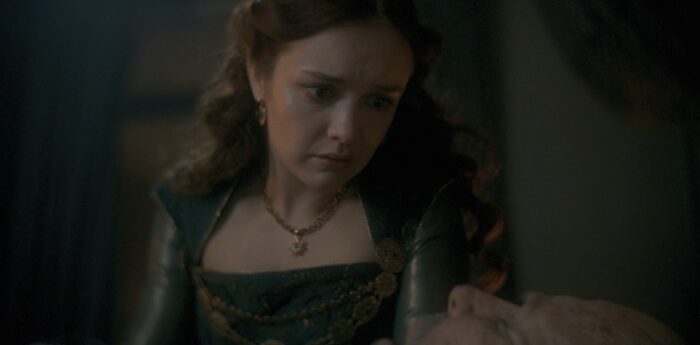
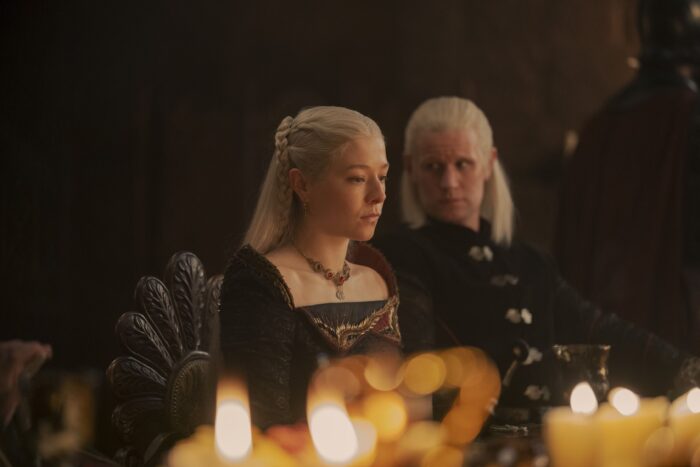
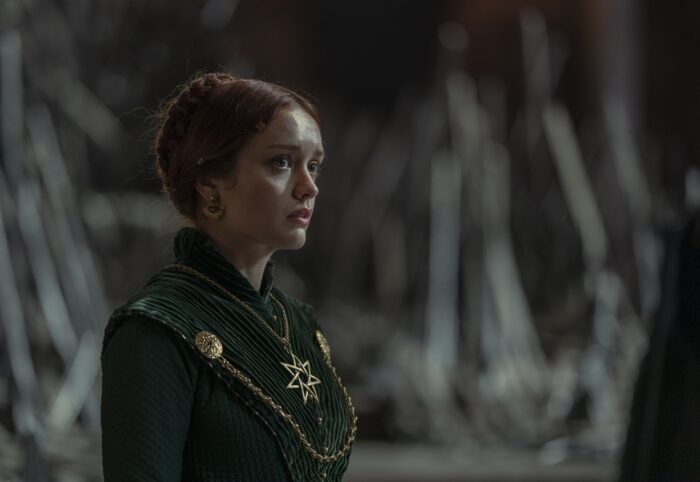
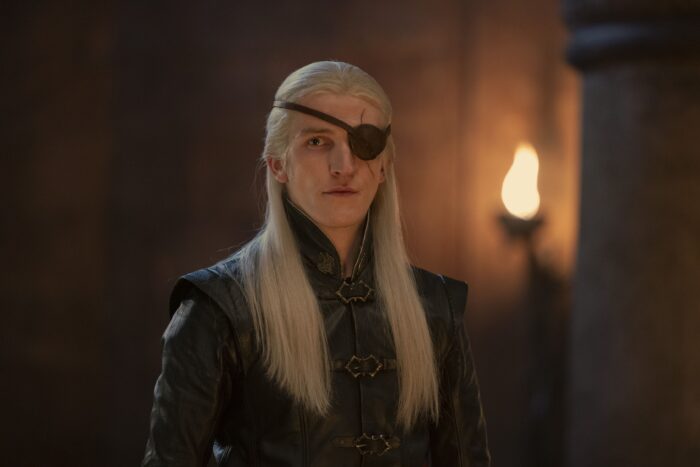
No comments:
Post a Comment